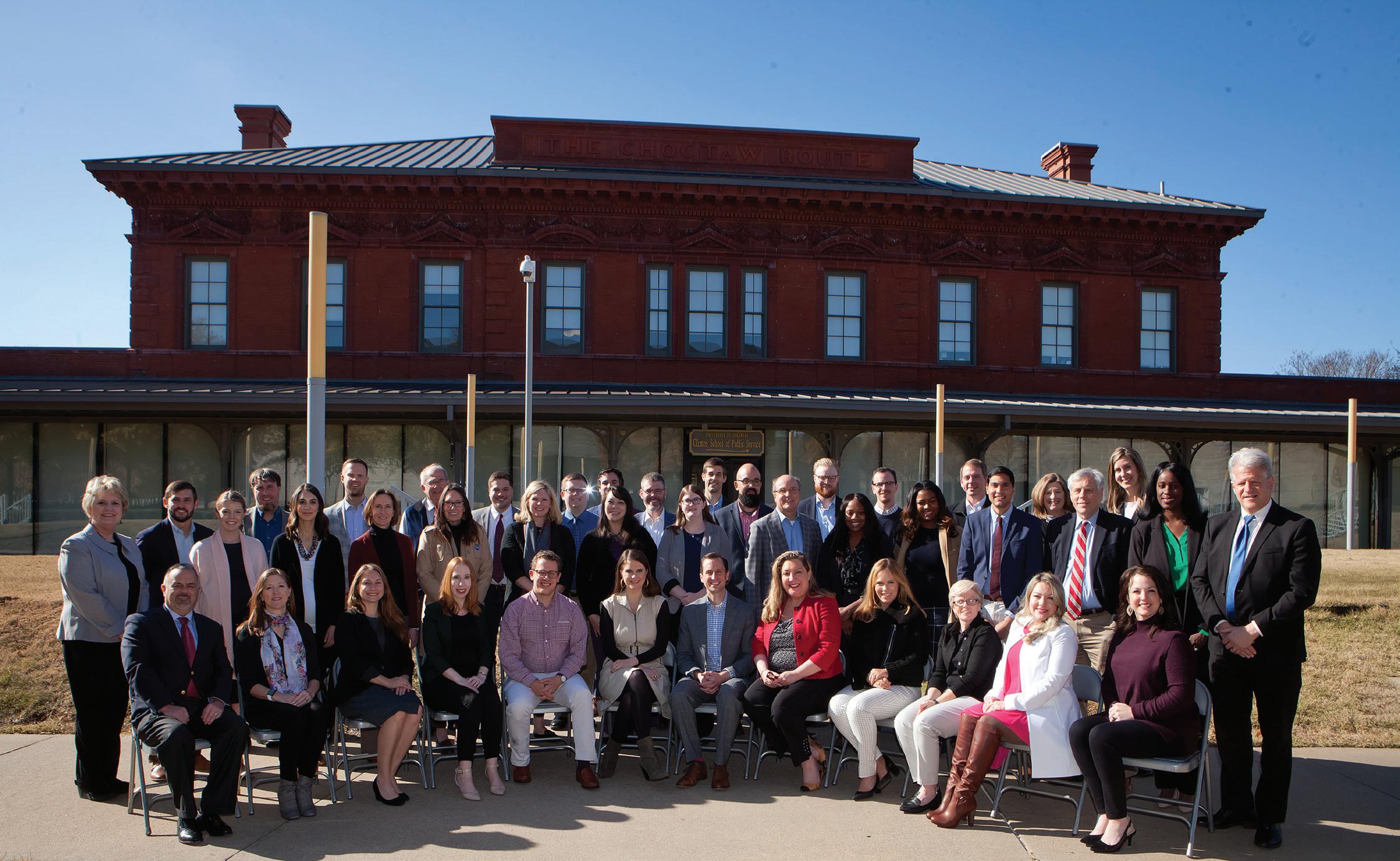
28 minute read
Inaugural Public Service Academy
“The best way to find yourself is to lose yourself in the service of others.” Mahatma Gandhi.
chaired by: Maggie Benson and Nate Looney
Advertisement
With assistance by: Nikolai DiPippa and Jay Robbins
Steering Committee: Former Chief Justice Howard Brill Judge Earnest Brown Speaker Matthew Shepherd
Thank you to our sponsors • University of Arkansas School of Law • University of Arkansas Little Rock William H. Bowen School of Law • ArkBar Civil Litigation Section • ArkBar Government Practice Section • Rose Law Firm • Brian Rosenthal
“Never doubt that a small group of thoughtful, committed citizens can change the world; indeed, it’s the only thing that ever has.” Margaret Mead
The Arkansas Bar Association and the University of Arkansas Clinton School of Public Service launched the inaugural class of the Public Service Academy in Little Rock November 15-16, 2019, and in Fayetteville January 17-18, 2020. The Public Service Academy was established to provide serviceminded lawyers the tools they need to serve in both elected office and as volunteers. The academy is believed to be the third program sponsored by a bar association in the United States following North Carolina (2017) and Tennessee (2018).
“Do we really need more lawyers in service?” The answer is an emphatic yes! Lawyers lead, serve and give back to their communities in so many ways. Our competitive, statewide Public Service Academy will serve as a launchpad for public service achievements by these attendees as well as those they mentor.
Arkansas Bar Association President Brian Rosenthal’s remarks to the inaugural class of 25 lawyers and 12 students from the University of Arkansas, Fayetteville School of Law, Bowen School of Law and the Clinton School of Public Service are excerpted on the following page.
On page 32, you will find descriptions of the presentations that were made and a listing of our presenters at our two sessions. Read more about the academy at www.arkbar.com/events/public-service-academy. The next academy will be in 2021.
Westley Ashley
Kelsey Bardwell
Caleb Baumgardner
Kandice Bell
Kelly Brown
Martha McKenzie Hill
Jera Houghtaling
Alexander Jones
Tabitha Lee
Lauren Manatt
S. Taylor Chaney
Cara Boyd Connors
Tyler R. Farrar
Amy Freedman
Pam Percefull Hathaway
Students University of Arkansas School of Law, University of Arkansas at Little Rock William H. Bowen School of Law and the University of Arkansas Clinton School of Public Service
Nate Arrington
Jennifer Browne
Skye Martin
Joey H. McCutchen, II
Mary “Molly” McGowan McNulty
Jeffrey H. Moore
Meredith Moore
Kara Butler
Caleb Conrad
Derick Dillard
Justin Gunderman
Liz Hall
Dequeshia Prude Brenda Simpson
Dusti Standridge Judge Sam Terry Wendy Scholtens Wood
Wesley Manus
Dana McGee Trent Minner
Madhav Shroff
Connor Thompson
On behalf of the Arkansas Bar Association and our Executive Director Karen Hutchins, Dean Skip Rutherford and Nikolai DiPippa from the Clinton School of Public Service, chairpersons Maggie Benson and Nate Looney, and staff liason Jay Robbins, we enthusiastically welcome you to the Inaugural Public Service Academy. The idea for the Public Service Academy grew out of a postcard from North Carolina Bar President Caryn Coppedge McNeill, who suggested its program could be replicated. After study, we determined that Arkansas like many states has seen a sharp decline in the number of lawyers who are serving in its legislature. In this last session there were approximately 15 lawyers in the legislature, down from approximately 30 in 1997 according to the Bureau of Legislative Research.
We have said unlike a judicial position, it is not necessary and you’re not required to be a lawyer to be in the legislature, and you are also not required to be a lawyer in many other opportunities for public service. However, it is undeniable the training lawyers receive in critical thinking, as well as an understanding of how rules, laws, regulations, orders and proposals can work together, or in opposition, are invaluable to our state, our country, and the organizations that are formed within them.
In this Public Service Academy, we are trying to refocus on that time in our country when people took time to serve. Each one of you has expressed through action or desire an interest in public service. During today and tomorrow and at the session in Fayetteville, our hope is to give you the tools necessary in order to decide when and how to make that decision.
I have looked for some of the best quotes on public service. Of course, John F. Kennedy’s quote about asking what you can do for your country is at the top of the list. [See other quotes on pages 30 and 32.] As I was preparing these remarks, I thought about these great individuals, and the many Americans who have served in public service. If you made a list of your Mt. Rushmore of America’s greatest citizens, would it include a non-president, like Benjamin Franklin? A woman like Harriet Tubman, Sandra Day O’Connor or Rosa Parks? I have no doubt that your Mt. Rushmore would have one thing in common with all others—it would include people who chose to serve, people who had the courage to reach down deep inside and use what they had within them to better society.
We are so excited to see what this class produces as far as public servants and leaders. You are 25 in number and 12 students hailing from all over Arkansas—Springdale to Dumas—Texarkana to Harrison and you are from Central Arkansas. We are very pleased to have so many with diverse backgrounds. We have those who have served in the military. We have an instrumental band instructor—band members make creative lawyers! We have non-lawyer students at the Clinton School and we welcome them.
class developed mantra— the alphabet of serivce:

Authentic beneficial committed dedicated empathy flexibility giving humility integrity justice kindness leadership meaningful noble optimistic persistent quality resilience strength Trustworthy unify volunteer willing xenodochial yearning zeal
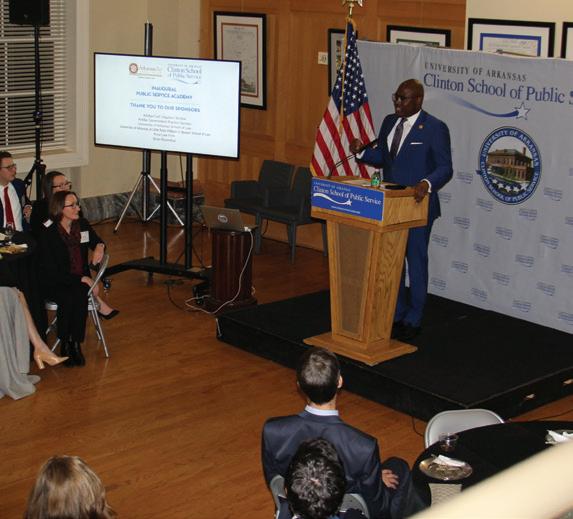
November Agenda Recap: Friday Welcome Reception at Clinton School of Public Service: Speakers: Chief Justice Dan Kemp, Little Rock Mayor Frank Scott, Jr. and ArkBar President Brian Rosenthal
Saturday Welcome: Nate Looney and Maggie Benson
Session 1: Public Service and the Law: Dean John DiPippa
Session 2: Attorney Panel: Former Representative Clarke Tucker; Judge Cathi Compton; Speaker of the House Matthew Shepherd; State Representative Carol Dalby; moderated by Former Little Rock Mayor Mark Stodola
Stories in Arkansas Politics: Clinton School of Public Service Dean Skip Rutherford and Roby Brock
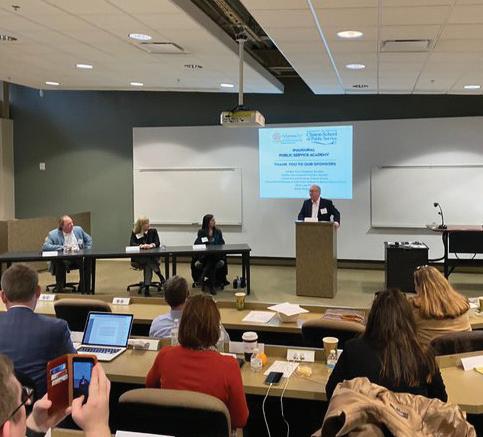
Session 3: Ethics/Campaign Finance: Graham Sloan, Director of the Arkansas Ethics Commission
Session 4: Campaign Consultants: Running a Successful Race: Michael Cook and Isaac Foley
January Agenda Recap: Friday Welcome Reception at the Fayetteville Chamber of Commerce: Speakers: Cynthia Nance, Dean Emeritus, University of Arkansas School of Law; Steve Clark, President and CEO, Fayetteville Chamber of Commerce; and ArkBar President Brian Rosenthal

Saturday Welcome at the University of Arkansas School of Law: Dean Margaret McCabe, University of Arkansas School of Law
Session 1: Public Service and Ethics: Former Chief Justice Howard Brill
Session 2: Reaching Your Voters–Field Strategies: Will Watson and J.R. Davis
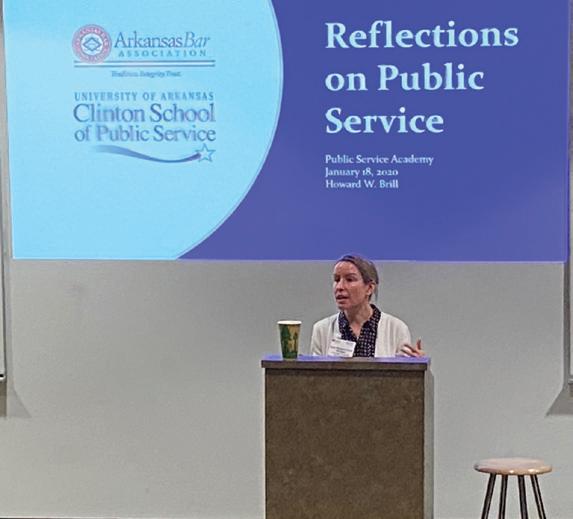
Public Service Outside Elected Office: Nate Coulter, David Gearhart, Dak Kees, Kelly Browe Olson and Nelson Peacock; moderated by Maggie Benson
Breakout Session—Public Service Fellowships
Session 3: The Art of Fundraising: Mark Henry, Scott Varady and Former Representative Rick Green; moderated by Nate Looney
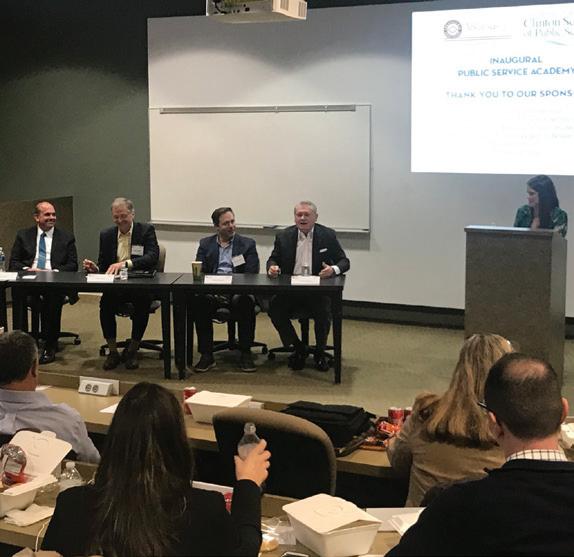
Session 4: Balancing Politics and Life in the District: Representative David Whitaker, Representative Nicole Clowney, Representative Gayla Hendren McKenzie, Moderated by Former Representative David Matthews
A
WORLD DIFFERENCE OF
Law Street Media Legal News Fastcase Legal Research
AI Sandbox Legal Data Analysis
NextChapter Bankruptcy Petitions + Filing Full Court Press Expert Treatises
Docket Alarm Pleadings + Analytics
Fastcase is one of the planet’s most innovative legal research services, and it’s available free to members of the Arkansas Bar Association. start your journey
LEARN MORE AT www.arkbar.com
DOWNLOAD TODAY
ROME, SHAKESPEARE AND THE RULE OF LAW
By Carl J. Circo
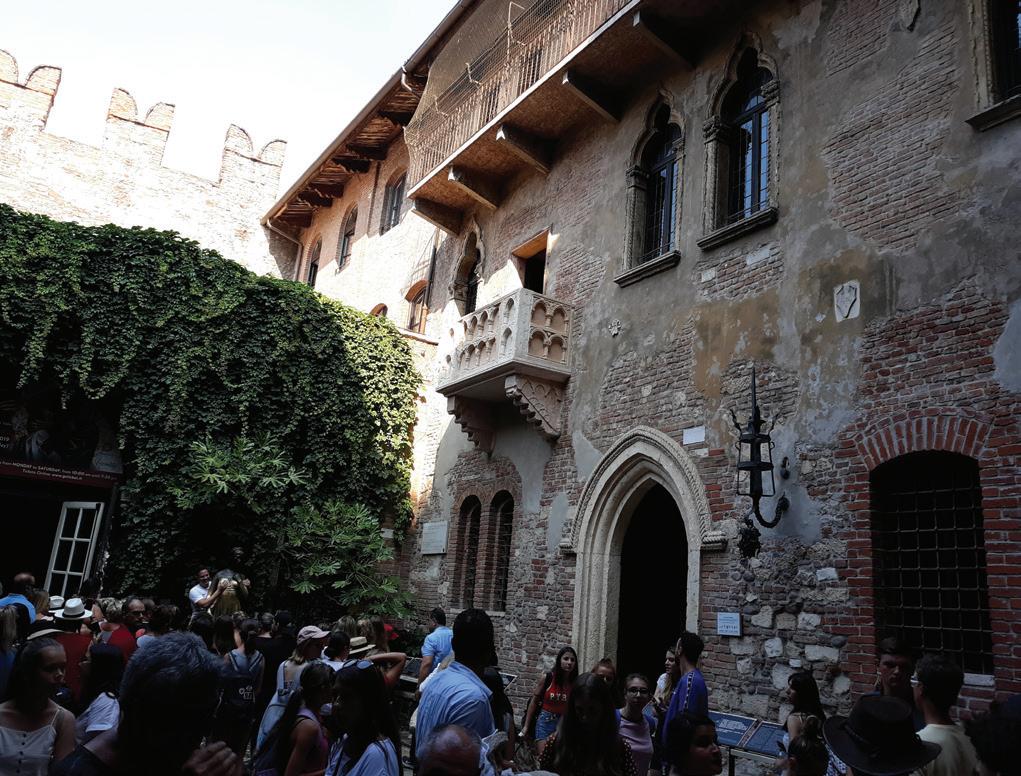
Juliet’s balcony in Verona
Carl J. Circo teaches Real Estate Transactions, Property, and Construction Law at the University of Arkansas School of Law, and is a fellow of the American College of Real Estate Lawyers.
34 The Arkansas Lawyer www.arkbar.com This summer, I had the opportunity to explore Shakespeare’s perspectives on law with a small group of students and a dear colleague in a study abroad program at the University of Arkansas Rome Center. The Center, located in the heart of Rome, is one of the University’s most extraordinary (and least known) resources. 1 My friend and colleague, Dr. Joseph Candido of the University’s English Department, and I taught a course for law students and humanities undergraduates that explored the law through five plays: Julius Caesar; Richard II; Henry V; The Merchant of Venice; and Measure for Measure. Our sessions included literary aspects of each play, such as “characterization, setting, tone, imagery, and symbolism” (as Dr. Candido’s syllabus specifies). For present purposes, however, I leave those matters to the domain of my most capable colleague, who presented them with passion and flare, much to our advantage. While anyone can learn much from Shakespeare’s portraits of law, a Shakespearean scholar’s guidance opens a door to a far richer experience. In this article, I aim only to illustrate some of what lawyers can learn by studying great literary portrayals of legal systems and institutions. The study of Western culture, and especially great literature, has figured prominently in Anglo-American legal education. 2 From before our country’s founding, literary stalwarts have influenced our leading legal minds. The Bible and Shakespeare influenced 18th and 19th century lawyers at least as much as did Blackstone. 3 Over time, however, the profession has lost some of its shared understanding of the human experience that once came from a common background in great literature. The law and literature movement offers one way to keep the humanities alive for lawyers. 4 Julius Caesar initiated a debate over how well legal institutions can order society politically. Shakespeare’s version of Rome’s violent transformation from republic to empire reinforces the legendary connection between liberty and eternal vigilance. 5 Julius Caesar leaves us puzzling why and how the Roman Republic failed, especially given the elegance with which Shakespeare’s Brutus and Cassius expressed the ideals of freedom and liberty centering the republic’s legal structure, and with equal force, pleaded the compelling case for resisting Caesar’s strongman rule. Questions much like these remain matters of first principles today.
We debated the disconcerting implications of the play’s compelling case for the Roman republic as an abstract ideal, which Shakespeare sets in conflict with the more concrete benefits a strong, unitary, and autocratic leader seemingly promised for the expanding empire. What should a reader in a modern constitutional democracy make of Caesar’s assassination that provoked a civil war, which in turn ex

changed a 400-plus years’ experiment in representative government for rule by emperors lasting almost as long? Must we conclude simply that military means can always repeal liberty supported solely by legal institutions? Or, might better-conceived and managed legal institutions have resolved the conspirators’ concerns, avoided the breakdown in civil order, and saved the republic? Do the legal institutions of modern constitutional democracies provide adequate alternatives to violence as the means for ousting a popular demagogue? Can Shakespeare’s Julius Caesar, Mark Antony, Brutus, and Cassius offer any useful lessons for today’s political leaders and dissenters? We noted with particular interest that Brutus, Cassius, and the other conspirators had no effective legal recourse to resist Caesar’s popular ascension to extralegal power, leaving them to decide, on behalf of their countrymen, whether Romans would “rather Caesar were living, and all die slaves, than that Caesar were dead, to live all freemen.” 6 At a more practical level, we studied the funeral speeches that Shakespeare masterfully crafted for Brutus and Mark Antony as demonstrations of effective oral advocacy. 7 We found especially useful a trial lawyer’s analysis of the orators’ display of closing argument skills. 8
A Roman bridge in Verona
Next, we took up a play set 1300 years later in England that presents remarkable similarities to the competing cases for and against a Caesar-like ruler. Richard II depicts a king deposed in part because he disregarded rights fixed in the hearts of English nobility from the time of Magna Carta. Chief among the king’s offenses was his refusal to respect private property rights. Richard’s crude manipulations of his royal power prevented Henry Bolingbroke from inheriting his father’s title and estate as Duke of Lancaster. 9 Richard’s confiscation of Lancaster’s property, however, struck a chord with other noblemen, who perceived similar threats to their own property rights. This decision, while arguably within the king’s legal power, left Bolingbroke in position to mount the uprising that ultimately left Richard in the dungeon at Pomfret Castle and Bolingbroke on the throne as Henry IV.
I find no better illustration of law as an instrument of society than the history of English land law, which serves as a backdrop to the play’s central action. We used selected aspects of feudal services and incidents to consider the importance of property law principles to Anglo-American law and to appreciate the feudal origins of our property law. We examined the limits on governmental authority over property rights that began with Magna Carta and evolved century after century, ultimately in favor of a propertied class, with such Parliamentary developments as the Statute Quia Emptores, the Statute of Uses, the Statute of Wills, and the Statute of Tenures, to name a few. 10 We also used an important secondary character in the play, the Duke of York, to begin a discussion on legal institutionalists and the concept of the rule of law that we would continue for the balance of the program. York, uncle of both King Richard and of the treasonous Bolingbroke, offers a remarkable instance of a politically influential figure distinguished by a steadfast commitment to law and legal process and a strict adherence to convention. We used the contemporary label “institutionalist” for this type, found not only in Richard II but in one form or another in each of the five plays. It was, however, York who best portrayed the institutionalist. Employing legalistic maneuvers and subtle rationalizations, York gradually evolves, first as a loyalist who resolutely stands by the duly anointed king despite Richard’s enormous political mistakes and ethical malfeasances, and later as the political actor who invokes legalisms to mediate Richard’s manufactured abdication; he gradually

and tentatively switches allegiance to Henry, until he finally manages to convince himself to accept Bolingbroke as Richard’s rightful successor, even being the one to summon the usurper to Richard’s throne, hailing “And long live Henry, fourth of that name!” 11 Henry V, in addition to continuing to examine legal institutions that establish and preserve governmental legitimacy and provide for succession in political leadership, also introduces another fundamental role of law in society. Henry V reigned from 1413 to 1422, a time during which international law, especially a code to regulate the conduct of war among nations, was emerging. 12 The play presents an ideal opportunity to gain a historical perspective on legal principles governing relations between sovereign states.
The play begins as Henry V, whose questionable claim to the throne derived from his father’s treasonous ouster of Richard II, solicits and ultimately accepts what we suspect he must recognize as tainted and debatable legal advice from two ecclesiastics. That advice supports his own claim to the French throne and his desire to conclude that his contemplated invasion of France would constitute a just war. In keeping with English social institutions of the time, the churchmen functioned not only as religious leaders, but also as trained legal experts qualified to advise the king on such matters. 13 They crafted a plausible interpretation of French law to support Henry’s ambitions because they knew that a war of conquest in France could provide much-needed revenue that could stop a bill pending in Parliament to confiscate church property.
36 The Arkansas Lawyer www.arkbar.com First, we debated the questionable reasoning behind the legal advice the king received. Next, by examining the conflict of interest that influenced the advice, we advanced our understanding of the connection between religion and law that Richard II first suggested. This was, however, only the beginning. Henry’s decision to invade France and his conduct of the war exposed the origins of international law and the principles of just war as then understood by the Christian countries of Europe, to which modern international law stills owes much. The play leaves unanswered some disturbing and still timely questions about war crimes. Henry’s decisions during the siege of Harfleur and in the battle of Agincourt (where Henry ordered the killing of French prisoners of war) continue to inspire heated debates among international scholars, lawyers, and jurists. 14 Ultimately, we viewed Julius Caesar, Richard II, and Henry V as a series exploring the role of law in governmental institutions. Each play tempts the modern reader to discern in Shakespeare an ambiguous or even fatalistic acceptance of the governmental structure of England at his time. Might we read each play as a veiled prayer, uttered in hushed tones to evade the Elizabethan censors, for a political system at least minimally responsive to the will and aspirations of its citizens? One commentator reflecting on the broader implications of these plays argues that they “fit between a classical Aristotelian notion of natural law integrating the individual into a larger society and the later concept of individual rights in a limited, liberal constitutional state.” 15 From that claim comes the suggestion “that these plays later had an important role in developing a better governmental system in the succeeding centuries.” 16 Subplots in Richard II and Henry V explore the royal prerogative to choose between the strict letter of the law and a more flexible, discretionary, and merciful application of the law. Consider, for example, King Richard’s arbitrary decision to pretermit a trial by combat between two nobles (Bolingbroke being one of them) who accused each other of treason, and instead, banish them both. 17 In another scene from Richard II, after Bolingbroke ascends to the throne as Henry IV, he grants his aunt’s plea to pardon her son, who has been exposed as a traitor. 18 Next, in an early scene in Henry V, the king ostentatiously rejects the advice of three noblemen who press him to enforce the law strictly by punishing a commoner who had insulted Henry. 19 Later, the play twice portrays Henry as an especially merciful military commander, once in his compassionate orders to his victorious army at Harfleur, 20 and the other when he pardons a common soldier. 21 Taken at face value, these scenes seem to praise the wisdom of a powerful leader who humanizes law with mercy. At the same time, each exposes tension between law, as an objective and constant set of rules, and law administered with broad discretion by someone arguably acting out of self-interest. Is justice through the wise exercise of mercy possible only when those who administer the law operate above it, or is such discretion the antithesis of a just legal system? The last two plays we studied brought such questions to the forefront.
Perhaps none of Shakespeare’s plays has generated as much reflection on law as has The Merchant of Venice. 22 The play places the law-mercy debate at center stage, which it famously develops in the context of a society devoted to commerce. Shakespeare exaggerated the problem by inserting the “pound of flesh” term into the bond Shylock ultimately insists the law must honor to serve the commercial values central to Venetian society. 23 In less sensational ways, modern courts continue to struggle to balance the sanctity of contract against harsh contractual terms or seemingly unfair or illogical results. 24 Must a court interpret a contract strictly according to the words the parties used, without the slightest regard for what they must have intended those words to mean? Should the law tolerate or even encourage the kind of rhetorical tricks that Portia, disguised as a respected doctor of the law, successfully employed to relieve Antonio of his burdensome bond and to punish Shylock for refusing the court’s pleas to settle the dispute on reasonable terms? Can a just legal system develop principles to strike unconscionable terms and to interpret enforceable ones flexibly? More broadly, whether for contracts or in other fields, can the law establish an acceptable boundary between rational judicial discretion and arbitrary judicial power?
Portia’s use of legal stunts in service of her vision of justice, together with the related problem of tempering the letter of the law with mercy, furnish especially clear examples of how lawyers, judges, law professors, and law students can learn from Shakespeare. Shylock, a Jewish moneylender much despised and yet much needed by Venetian society, brought his case to enforce the forfeiture term of the bond given to Shylock by his Christian archenemy, Antonio, to secure repayment of a debt of Antonio’s dear friend Bassanio. Because neither Bassanio, as principal, nor Antonio, as surety, was able to pay the debt on time, the bond entitles Shylock to a pound of Antonio’s flesh.
As soon as Shylock and Antonio appear before the ruling duke, he reveals institutionalist convictions by announcing he will order the forfeiture if Venetian law so requires. 25 Portia, disguised as a learned doctor of the law serving as the duke’s designated advisor, authoritatively confirms the bond’s validity. In her “quality of mercy” speech, she eloquently reprises a plea the duke himself previously made for Shylock to forego the bond’s harsh terms and accept a generous financial settlement. When Shylock refuses, the duke orders the forfeiture. As Shylock raises his knife to Antonio’s breast, however, Portia clarifies that the law requires strict adherence to the bonds terms, which “doth give thee here no jot of blood.” 26 Shylock finally agrees to settle, but Portia declares it too late because the court has already rendered judgment. Next, Portia announces that Shylock must lose all his wealth and beg the Duke’s mercy for his very life under an obscure provision of the Venetian code dealing with any alien who threatens the life of a Venetian citizen. The Duke relieves Shylock of the death sentence, but on conditions that not only still require of him all his wealth, but even his conversion to Christianity. Thus, the law dispenses radically different versions of justice and mercy for Antonio and for Shylock. We ended our study of The Merchant of Venice with the distinctly uneasy suspicion that many in our own society, including some of the more cynical members of the bar, believe law too often fails justice, no matter whether controlled by letter or spirit and even when it vests discretion in dukes or kings or judges to dispense mercy. More disturbing was our apprehension that Portia’s slick tricks portray a common perception of lawyers and the legal process. Finally, Measure for Measure continued our consideration of the law-mercy-discretion dilemma, this time set in the realm of criminal law and official abuses of power and social position. In brief, Measure for Measure confounds its characters and its audience with a series of dilemmas: what should those charged with the administration of law do when accepted social behavior mocks criminal prohibitions (think of today’s federal marijuana laws); do moral or religious principles stand above legal ones; who will listen when the politically powerful abuse the politically weak (think of the #MeToo movement); and should we prefer wise judges over wise laws to serve justice? Measure for Measure served as an especially fitting end to our study of Shakespeare’s critique of law because it challenges everyone concerned with law to offer a workable definition of justice itself and demands legal institutionalists to defend their commitment to the rule of law in the face of recurring injustice. Although the play has been used to support widely divergent interpretations about law as an instrument of society, the conventional version sees it “as portraying the tension between law and discretion, between strict and loose construction of laws, between justice and mercy, between law and morality.” 27 To conclude this brief excursion into the field of law and literature, let me suggest that great literature about law, just as law itself, is too important to leave to the experts. Literature helps to humanize the development, practice, and administration of law. The best lawyers and judges already know this.
Endnotes: * The author gratefully acknowledges the helpful research assistance of Levi Jefferies, a second-year student at the School of Law. 1. Information about the Rome Center is available at https://www.uarkrome.it/. 2. See generally Charles R. McManis, The History of First Century American Legal Education: A Revisionist Perspective, 59 Wash. U. L. Q. 597 (1981). 3. E.g., Madeline Sapienza, A Little Touch of Shakespeare at the American Bench and Bar, 22 VT. B.J. & L. Dig. 20 (1996). 4. See generally Richard Weisberg, What Remains “Real” about the Law and Literature Movement?: A Global Appraisal, 66 J. Legal Educ. 37 (2016); Richard A. Posner, Law and Literature: A Relation Reargued, 72 Va. L. Rev. 1351 (1986). 5. The origins of the phrase “Eternal Vigilance is the Price of Liberty” came from John Philpot Curran, an eighteenth-century Irish lawyer and politician. See Suzy Platt, Respectfully Quoted: A Dictionary of Quotations 200 (1993). 6. William Shakespeare, Julius Caesar act 3, sc. 2. 7. See id. 8. See Peter W. Murphy, In re Julius Caesar, Deceased: Whoever Wrote “Shakespeare” Knew a Few Things about Closing Argument, 30 Am. J. Trial Advoc. 71 (2006). 9. SeeWilliam Shakespeare, King Richard act II act 2, sc. 1. 10. See Cornelius J. Moynihan, Introduction to the Law of Real Property 21-25 (1962). 11. SeeWilliam Shakespeare, King Richard II act 4, sc. 1. 12. Theodor Meron, Shakespeare’s Henry the Fifth and the Law of War, 86 Am. J. Int’l. 1, 2-4 (1992). 13. See Robert J. Delahunty, The Conscience of a King: Law, Religion, and War in Shakespeare’s King Henry V, 53 J. Cath. Legal Stud. 129, 130-131, 139-142 (2014). 14. See id.; Meron, supra note 12. 15. C. M. A. McCauliff, The Right to Resist the Government, 14 Ilsa J. Int’l & Comp. L. 9, 13 (2007). 16.. Id. at 16. 17. See William Shakespeare, King Richard act II act 1, sc. 1. 18. See id. at act 5, sc. 3. 19. See William Shakespeare, Henry V act 2, sc. 2. 20. See id. at act 3, sc. 3. 21. See id. at act 4, sc. 8. 22. Westlaw reveals over 800 articles and 200 cases mentioning “Merchant of Venice.” 23. See William Shakespeare, The Merchant of Venice act 4, sc. 1. 24. See, e.g., David Campbell, The Incompleteness of Our Understanding of the Law and Economics of Relational Contract, 2004 Wis. L. Rev. 645. 25. See William Shakespeare, The Merchant of Venice act 4, sc. 1. 26. See id. 27. Daniel J. Kornstein, A Comment on Prof. Halper’s Reading of Measure for Measure, 13 Cardozo Stud. L. & Lit. 265, 267 (2001).
Members who have served in the military This list is a supplement to the feature published in the Fall 2019 issue of The Arkansas Lawyer magazine. The list is not inclusive and was compiled from member contributions. Special thank you to all members who have served our country. If you know of a member who should be included in future publications, please contact the editor.
David F. Barton, Lt. Col,. USAF (Retired). While in the Philippines the USAF exited Vietnam and his unit was the airlift support unit that supported the repatriation of U.S. prisoners of war from North Vietnam.
Marilyn Dearien Barton, Colonel, USAF (Retired) joined the USAF in 1979 and joined her husband, David F. Barton, who was also a Judge Advocate. Marilyn served at Eglin AFB, FL, The Pentagon, Randolph AFB, TX, MacDill AFB, FL and Kelly AFB, TX.
Charles A. Brown was a part of the 1954 drafted group assigned to then Camp Chaffee. After basic training there he was assigned to Fifth Army Headquarters JAG at Colorado Springs. He reviewed Summary and Special Court Martial cases for the Colonel in Charge. He was raised from E-1 to Specialist E-5 in 1954. From then Fort Carson, he was requisitioned to the JAG unit of the 1st Calvary Division, at Sendai, Japan. He received the Meritorious Service Medal before separation from service in 1955.
Major Natalie G. Brown, Deputy Staff Judge Advocate Arkansas National Guard. James A. Buttry (1940- 2013) served three years in the United States Army, being discharged as a Captain in 1966.
Johnathan D. Dial, Sr., Captain, U.S. Army (Ret.). John enlisted in 1996. He earned an infantry commission with the 82nd Airborne Division in 2002. John was a 2003 Honor Graduate of the Infantry Officer Basic Course before deploying to Iraq. There he recruited, trained, and embattled a rifle company of Iraqis in support of 3-325 Airborne Infantry Regiment. He later served as an anti-tank platoon leader, HHC executive officer, and general’s staff officer. John was severely wounded and medically retired in 2006.
Oscar Fendler (1909-2002) was an officer in the U.S. Naval Reserve (serving as a legal specialist). Fendler was called to active duty in 1942. During the war, he served at several bases around the United States before being transferred to the Pacific Theater. He spent most of the war in the Philippines, with special assignments that took him to Australia and China. Fendler left active duty in 1945, receiving a Bronze Star for his war service.
Martin G. Gilbert was commissioned a Second Lieutenant (Infantry) with active duty deferred in 1961 to attend law school. In 1964, he transferred to the U.S. Army Judge Advocate General’s Corps as a First Lieutenant and went on active duty in September 1964. He served in the JAG Office of 1st Logistical Command, Saigon, Vietnam, from 1965-66, during which time he was promoted to Captain and received the Army Commendation Medal. He received the Army Commendation Medal with Oak Leaf Cluster.
Paul Leo Giuffre (1933-2020) served in the U.S. Navy from 1955-57. Robert L. Jones, Jr., (1922-2004), as a Private First Class, was at Normandy in 1944 and stationed in Germany in 1945. He was then commissioned as First Lieutenant and was in the JAG Corp at Fort Chaffee, Arkansas, during the Korean Conflict.
Dak Kees currently serves as a Staff Judge Advocate Officer in Arkansas Army National Guard Judge Advocate General’s Corps in rank of Major.
James H. McKenzie (1941-2002) served in active duty as a Second Lieutenant in the U.S. Army Military Police and served two years active duty, which included service at Seneca Army Depot, Romulus, NY.
Dr. Morriss Murphey Henry was commissioned as captain in the Air Force and was chief of the Eye Clinic in Bitburg, Germany.
Eudox Patterson, 1st Lieutenant, U.S. Army, served six years as an ordnance officer, the last of which was in Vietnam. He is now a disabled American Military Veteran from slushing around in Agent Orange in 1967-68.
Andy Rittenhouse, First Lieutenant, U.S. Army Judge Advocate General’s Corps. He is a Judge Advocate and serves as Trial Counsel for the 87th Troop Command Brigade.
Adam Rose, Major, U.S. Army, currently serves as a Judge Advocate, Special Victims’ Counsel with the National Guard Bureau, Office of Chief Counsel. Major Rose received an LL.M. in Military Law from the Judge Advocate General’s Legal Center and School, Charlottesville, VA in 2018. Major Rose has been a member of the Arkansas Army National Guard since 2011. Judge David L. Rush was commissioned as an Ensign in the United States Navy in 1975 after graduating from the University of Arkansas in 1974. While on active duty he served onboard many Aircraft Carriers and other surface combatants while forward deployed to the Western Pacific. Upon release from active duty, he completed law school at the U of A and remained in the Naval Reserve. Judge Rush served as Commanding Officer of the Naval Reserve Units in Fort Smith and Fayetteville. During his tenure he served on numerous ships from the Western Pacific to the North Atlantic. Judge Rush retired from the Navy as a Commander in 2004.
the U.S,.entered World War I. He had 21 months of service in the Army, including six months in France, and was a captain when he was discharged.
Scott E. Smith, Captain, United Stated Marine Corps. From 1985-1988 he served as Judge Advocate stationed at Camp Pendleton assigned as a Trial Counsel and as a Special Assistant U.S. Attorney prosecuting civilian crimes occurring on military bases in Southern California. He was recalled to active duty 1990-1991 to serve as an infantry platoon commander in Desert Shield/Desert Storm with India Company, 3rd Battalion, 23rd Marine Regiment in Saudi Arabia and Kuwait. 1961 until 1964, where he earned the rank of Captain.
Todd C. Watson, First Lieutenant, U.S. Army, serves with the 326th Trial Defense Team as a Judge Advocate in the Arkansas National Guard. He has been in the Guard since February 2016.
COL Jeffery D. Wood, the State Judge Advocate General.
John Cecil Shane (1887-1942) helped organize the first military unit in Paragould when
Thomas Streetman (1937-2019) proudly served in the U.S. Air Force as a JAG officer from











